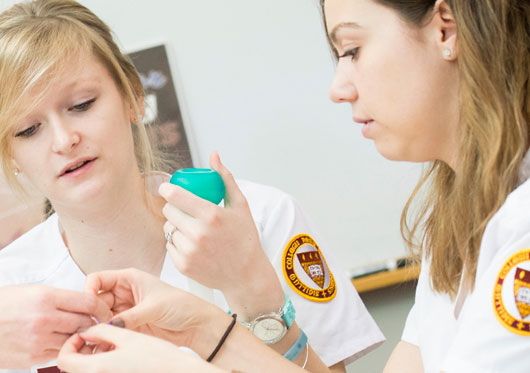Nurse practitioners (also called NPs) are an integral part of our healthcare system. Because they have completed additional training and education compared to registered nurses, NPs have a greater level of prescriptive, diagnostic, and clinical authority which in some cases rivals that of doctors.
Their responsibilities include providing primary, specialty, and acute care to the patients under their charge. In this regard, they will diagnose, treat, and educate patients about injury, illness, and other health issues.
For their hard work, nurse practitioners are paid an average of $129,480 per year, according to the US Bureau of Labor Statistics. The Bureau also estimates that the field will experience explosive growth in the coming decade. Between 2023 and 2033, it’s estimated that the total number of nurse practitioners in the US will grow by 45 percent, compared to a much more modest growth rate of four percent for all occupations.
This competitive salary, high level of job stability, and increased freedom in the workplace are all reasons that people choose to become nurse practitioners. But at the heart of the decision for many is a desire to help their patients.
“I chose to be in this field because I enjoy helping people in a holistic way,” says Paul Padula, NP, and 2020 graduate from the Accelerated Direct-Entry MSN program at Regis College. “Today, I love diagnosing, treating, prescribing, and being able to help my patients make the best possible decisions about their health.”
Are you interested in becoming a nurse practitioner? Below, we outline the key steps that it will take for you to get there and explain the average amount of time it takes to break into the field, so that you can make a more informed decision about your career aspirations.
Steps to Become a Nurse Practitioner
The exact steps that you will follow to become a nurse practitioner do vary somewhat depending on which state you aim to practice in. That being said, the steps below speak to common requirements for becoming an NP. Be sure to check with the requirements in your own state before getting started.
1. Become a Registered Nurse.
In order to become a nurse practitioner, you will first need to become a registered nurse. This is a requirement. To do so, you will need to complete an accredited nursing program.
A number of different degrees can help you fulfill this requirement. While an associate’s degree is often considered to be the lowest level of education required to become a registered nurse, many states and employers have begun requiring a bachelor’s degree in nursing (BSN). Regardless, if your plan is to eventually become a nurse practitioner, earning your BSN is recommended, as you will need your bachelor’s degree in order to pursue the graduate education required of nurse practitioners (more on this below).
If you’ve already completed an associate’s degree, but do not yet have your BSN, bridge programs exist to allow you to complete your degree in an accelerated manner. An example of this is the RN-to-BS completion program at Regis College. Additionally, those who have completed a bachelor’s degree not in nursing can enroll in a variety of accelerated programs that allow them to earn their BSN in less than four years. At Regis, for example, we offer 16-month and 24-month accelerated options.
After completing your degree, you will need to pass the NCLEX-RN Exam and then apply for licensure in the state in which you wish to practice as a registered nurse.
2. Pursue a Graduate Education.
While an undergraduate degree and completion of state licensure will in most cases be enough to allow you to practice as a registered nurse, you will need to complete a graduate degree in order to ultimately become a nurse practitioner. Depending on the state in which you hope to practice, the employer you hope to work for, and your personal career goals, this requirement may be fulfilled by earning either a Master of Science in Nursing (MSN) or Doctor of Nursing Practice (DNP).
Not sure whether you should pursue your MSN or DNP? While an MSN can still enable you to become a nurse practitioner in some cases, the DNP is increasingly becoming the required degree. A DNP is also a more advanced degree that prepares you for more senior roles in the healthcare industry. DNPs and MSNs also vary in their clinical practice, research, and specialties.
Because many students enter college knowing that they would like to become a nurse practitioner, and because earning either an MSN or DNP are required to reach that goal, many colleges and universities offer joint programs or bridge programs designed to enable students to earn multiple degrees in a shortened time frame. For example, at Regis the following degrees are offered:
3. Seek a Certification Relevant to your Career Goals.
If you would like to work with a particular population of patients, then earning a specialty certification can be an excellent way of reaching that goal.
The requirements to earn a certification will vary depending on the certification as well as the organization that offers it. That being said, most NP specialty certifications require that candidates have completed the required academic course load, performed a certain amount of clinical work, and passed an examination.
If you hope to pursue a given specialization, it’s important that the graduate degree program you pursue offers that specialty as a track. At Regis College, for example, we offer five nurse practitioner tracks that students can opt into: adult-gerontology, pediatric, psychiatric-mental health, women’s health, and family medicine.
Once you’ve completed the coursework for your desired track, you’ll take the appropriate certification exam (just like the NCLEX-RN exam). This certification is maintained yearly by the practitioner, and is separate from the state licensure.
Additionally, nurse practitioners must also be board certified. Learn more about board certification here.
4. Obtain State Licensure.
Upon completing your degree and certification, you can apply for licensure in the state in which you wish to practice. The specific requirements for licensure will vary by state (you can see a list of state-by-state requirements here), but typically include:
- Submitting an application
- Paying an application fee
- Fingerprinting/background check
Often, a temporary license can be granted for a period of a few weeks while the permanent license is being considered and approved.
So how long does it Really take to Become a Nurse Practitioner?
Ultimately, how long it takes you to become a nurse practitioner will depend on a number of factors. The most impactful of factors is whether or not you choose to gain work experience in between becoming a registered nurse and becoming a nurse practitioner.
Many aspiring nurse practitioners choose to earn their BSN and then work for a number of years as an RN before returning to school to become an NP.
If this is the route that you take, you can expect your BSN to take between two to four years (depending on whether or not it is an accelerated program). Discounting the time you spend working, you can then expect to dedicate another two to five years to earn your MSN/DNP when you are ready to return to school. Again, this will depend on the specific degree program you enroll in, as well as whether you are pursuing part-time or full-time study.
On the other hand, if you choose to become an NP without taking time to work in between your degrees, it may be possible in as little as three to five years in total. Students who enroll in the Accelerated Direct-Entry MSN at Regis, for example, can earn their BSN and MSN in three years. It is then possible for those students to complete their DNP in as little as an additional two years, if desired.








